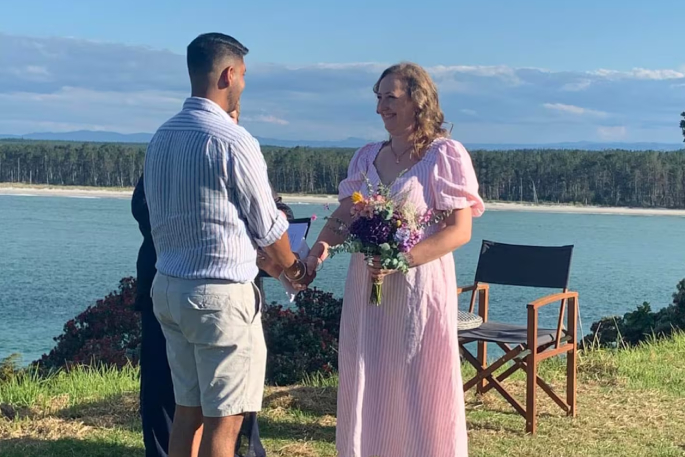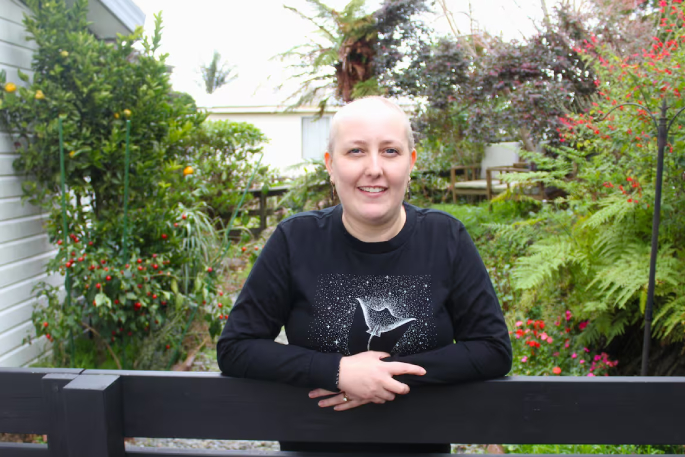Maia Hendrix is playing a waiting game after a regimen of radiotherapy and chemotherapy for her brain cancer.
The Bay of Plenty woman has been diagnosed with grade three astrocytoma brain cancer and is counting down the days until her next brain scan in July, which she hopes will indicate if the gruelling treatment is working.
It’s a frustrating place to be in, says the 34-year-old early childhood teacher from Katikati.
“So many people are asking me if has it worked and I say, ‘I don’t know’.
“I want to know.”
Maia was diagnosed after experiencing vertigo and loss of sensation on the left side of her body late last year.
An MRI scan exposed a mass in her brain. She underwent a biopsy of the mass where surgeons drilled a hole into her skull. She still has the “dent” on the side of her head from the biopsy operation.
The tumour is on the right side of her brain, which controls the left side of her body.
Her medical team was reluctant to take the tumour out as it was in the part of the brain that controls movement.
Surgery was not recommended because there was a risk of paralysis, which they would only take at stage four.
Maia has completed six weeks of radiotherapy with the oral chemotherapy drug temozolomide, with more to come.
She had an intense 33 sessions of radiotherapy, five days a week for six-and-a-half weeks at Tauranga’s Kathleen Kilgour Centre.
“Radiotherapy seemed to be doing more damage than the chemo; fatigue, losing my hair, nausea and painful headaches and migraines.”
She had to take steroids to combat the pain.
She lost her hair from radiotherapy because it targeted the brain, but new hair growth was now coming through.
‘’[Husband] Simon calls me Tommy from Rugrats.”
 Maia Hendrix and Simon ticked off a bucket list item and got married before cancer treatment. Photo supplied.
Maia Hendrix and Simon ticked off a bucket list item and got married before cancer treatment. Photo supplied.
The couple fast-tracked their marriage and underwent IVF treatment to have viable embryos for the future.
The new plan is a year of the same chemotherapy drug at varying doses to keep the tumour at bay.
She now has five days of chemotherapy followed by three weeks off.
This week is her fourth cycle of chemotherapy and she dreads each cycle as it comes along.
“The last one I just had was pretty awful, I was nauseous. I lost my sense of taste, I could not sleep well as I just couldn’t get comfortable … I was just miserable. I was crying a lot.”
A friend initially set up a Givealittle page that raised $18,000.
“Without that money, I don’t know where we would be.”
The couple have a big mortgage which realistically required two incomes for them to service. It had been a hard task to access money through social services for assistance during this time, she says.
Brain tumours are a relatively rare cancer in New Zealand and represent less than 1.4 per cent of all cancers diagnosed here. But they are one of the most deadly cancers.
On June 24, the Government announced a $604 million funding boost for cancer medicines over four years.
But that meant little for brain cancer patients. The chemotherapy drug temozolomide, which Maia is on, was the last medicine approved in New Zealand for brain cancer, almost 20 years ago.
Maia, at times, fears for the future.
“Sometimes I feel pretty normal and sometimes I’m pretty depressed, it comes in waves.
“I don’t think I’ll ever be cancer-free. It’s not the medical teams’ plan to remove the tumour so I’m always going to have at least some of it.
“I’ll be continuing treatment — the tumour won’t necessarily be growing because they’ll keep it at bay — but I feel like it’s always going to be there.
“But I’m just practical and positive. I have lived day to day since this started.
“There’s no point worrying about what could happen as that would be wasting the time I have now.”



0 comments
Leave a Comment
You must be logged in to make a comment.